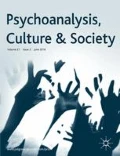Abstract
Psychoanalysis has a central yet contested position in the emergence of psychosocial studies as a new ‘transdisciplinary’ space. Psychoanalysis potentially offers a vocabulary and practice of crossing boundaries that seems to be at one with the psychosocial project of understanding psychic and social processes ‘as always implicated in each other, as mutually constitutive, co-produced, or abstracted levels of a single dialectical process’ (Frosh, 2018a). The intersection ‘psychoanalysis, culture, society’, with its promise of an explicit engagement with social, political and ethical relations, and its traversing of disciplinary boundaries across the arts, humanities and social sciences, should therefore be crucial for the psychosocial project. This paper will consider where we are with ‘psychoanalysis, culture and society’ in relation to the ‘psychosocial’ – and what this means for a world much in need of more fluid, trans/disruptive boundaries.
Similar content being viewed by others
References
Altman, N., Benjamin, J., Jacobs, T., and Wachtel, P. (2006) Is politics the last taboo in psychoanalysis? In L. Layton and N. Hollander and S. Gutwill (eds.), Psychoanalysis, Class and Politics. London: Routledge.
Baraitser, L. (2015) Temporal drag: Transdisciplinarity and the ‘case’ of psychosocial studies. Theory, Culture and Society, 32(5-6): 207–231.
Bhabha, H. (2004) The Location of Culture. London: Routledge.
Blackman, L. (2008) Affect, relationality and the ‘problem of personality’. Theory, Culture and Society, 25(5): 23–47.
Brickman, C. (2003) Aboriginal Populations in the Mind. New York: Columbia University Press.
Brown, W. (2010) Walled States, Waning Sovereignty. Cambridge: MIT Press.
Butler, J. (1997) The Psychic Life of Power. Stanford: Stanford University Press.
Campbell, J., and Pile, S. (2010) Telepathy and its vicissitudes: Freud, thought transference and the hidden lives of the (repressed and non-repressed) unconscious. Subjectivity, 3(4): 403–425.
Damousi J., and Plotkin M. (eds.). (2012) Psychoanalysis and Politics: Histories of Psychoanalysis under Conditions of Restricted Political Freedom. Oxford: Oxford University Press.
Danto, E. (2005) Freud’s Free Clinics: Psychoanalysis & Social Justice. New York: Columbia University Press.
Davids, F. (2011) Internal Racism: A Psychoanalytic Approach to Race and Difference. London: Palgrave.
Fanon, F. (1952) Black Skin, White Masks, 1986. London: Pluto Press.
Fletcher, J. (2013) Freud and the Scene of Trauma. New York: Fordham.
Frosh, S. (2012) The Re-Enactment of Denial. In A. Gulerce (ed.), Re(con)figuring Psychoanalysis: Critical Juxtapositions of the Philosophical, the Sociohistorical and the Political. London: Palgrave.
Frosh, S. (2013) Hauntings: Psychoanalysis and Ghostly Transmissions. London: Palgrave.
Frosh, S. (2017) Primitivity and violence: Traces of the unconscious in psychoanalysis. Journal of Theoretical and Philosophical Psychology, 37(1): 34-47.
Frosh, S. (2018a) Psychosocial studies and psychoanalysis. In H. Stam and H. Looren de Jong (eds.), The SAGE Handbook of Theoretical Psychology. London: Sage.
Frosh, S. (2018b) Psychoanalysis, politics and society: What remains radical in psychoanalysis? In R. Gipps and M. Lacewing (eds.), The Oxford Handbook of Philosophy and Psychoanalysis. Oxford: Oxford University Press.
Frosh, S., and Mandelbaum, B. (2017) ‘Like kings in their kingdoms’: Conservatism in Brazilian psychoanalysis during the dictatorship. Political Psychology, 38(4): 591–604.
Frost, R. (1916) ‘Mending Wall’. In Lathem, E. (ed.), The Poetry of Robert Frost. New York: Holt Rinehart and Winston.
Goldner, V. (2003) Ironic gender/authentic sex. Studies in Gender and Sexuality, 4(2): 113–139.
Gordon, A. (1997) Ghostly Matters: Haunting and the Sociological Imagination. Minneapolis: University of Minnesota Press.
Hook, D. (2008) The ‘Real’ of racializing embodiment. Journal of Community and Applied Social Psychology, 18(2): 140–152.
Jacoby, R. (1983) The Repression of Psychoanalysis. New York: Basic Books.
Khanna, R. (2004) Dark Continents: Psychoanalysis and Colonialism. Durham: Duke University Press.
Kovel, J. (1995) On racism and psychoanalysis. In: A. Elliott and S. Frosh (eds.) Psychoanalysis in Contexts. London: Routledge.
Roudinesco, E. (2016) Freud in His Time and Ours. Cambridge: Harvard University Press.
Rustin, M. (1991) The Good Society and The Inner World. London: Verso.
Seshadri-Crooks, K. (1994) The primitive as analyst: Postcolonial feminism’s access to psychoanalysis. Cultural Critique, 28 (Autumn): 175–218.
Spivak, G. (1988) Can the subaltern speak? In C. Nelson and L. Grossberg (eds.), Marxism and the Interpretation of Culture. Urbana, IL: University of Illinois Press.
Stavrakakis, Y. (2007) The Lacanian Left. Albany: State University of New York Press.
Wetherell, M. (2012) Affect and Emotion: A New Social Science Understanding. London: Sage.
Whitebook, J. (2017) Freud: An Intellectual Biography. Cambridge: Cambridge University Press.
Winograd, B. (2014) Black Psychoanalysts Speak. PEP Video Grants 1(1):1.
Author information
Authors and Affiliations
Corresponding author
Rights and permissions
About this article
Cite this article
Frosh, S. Rethinking psychoanalysis in the psychosocial. Psychoanal Cult Soc 23, 5–14 (2018). https://doi.org/10.1057/s41282-018-0072-5
Published:
Issue Date:
DOI: https://doi.org/10.1057/s41282-018-0072-5




